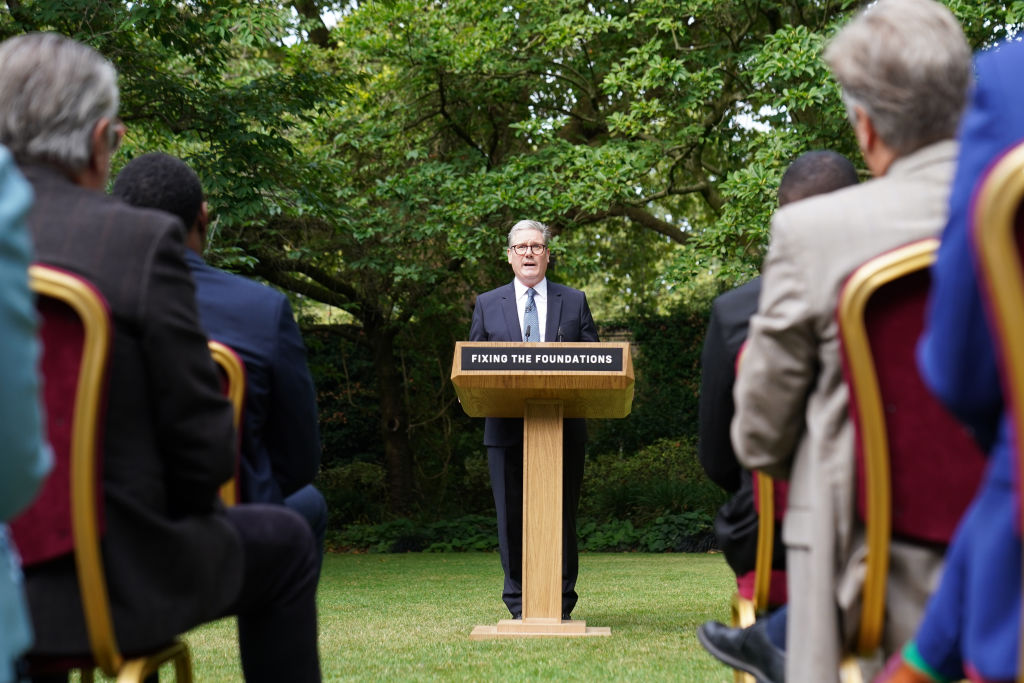Barely two months after its landslide victory, the new government’s honeymoon is well and truly over. After the summer strife and before this winter’s discontent, Labour’s lack of bold political vision and transformative policies — which was all too visible during years in Opposition and the general election campaign — has been further exposed by events which have a habit of haunting every party newly in power.
Pinning the “rot of riots” on “14 years of Tory failure” and on the “snake oil of populism”, as the Prime Minister did in his Downing Street garden speech this morning, won’t cut it with people. The public has a sense that the roots of our national woes go much deeper — more than 40 years of a broken economic and social settlement which we owe to Margaret Thatcher and Tony Blair, as well as their heirs Gordon Brown, David Cameron and Rishi Sunak.
The mantra “there is no alternative” has produced decades of rampant economic and social individualism dressed up as progress, when in reality we have gained individual freedoms yet lost stability and common solidarity. Britain’s social fabric is unravelling as a result of the individualist creed shared by the Tories and Labour that has left us as a country freer yet lonelier. Today, the UK is at once more diverse and more fragmented, as the riots revealed.
By pinning the blame on populism today, Keir Starmer told at best half the story of why things have in fact got a lot worse. The other half is the dominant centrist ultra-liberalism of the last half-century, and the economic and social disruption wrought by the resulting policies. Privatising public utilities such as water, energy and railways left Britons with extortionate bills and depleted services. Austerity-induced cuts destroyed much of local government and other vital public services. The relentless financialisation of Britain has accelerated the decline of industry and manufacturing and made us over-reliant on exporting globally tradable services in an age of trade wars and rising protectionism.
Meanwhile, the benefits of mass immigration in terms of demography, talent and cultural enrichment have accrued disproportionately to the affluent middle classes while putting pressure on already underfunded public services and exacerbating the dramatic shortage of affordable housing, all of which hits the poorest hardest. It is this class which is most likely to demand limits on the volume of inward economic migration, not to mention tackling illegal immigration.
All this happened on the centrist watch of New Labour and Conservative governments, and their joint failure has produced a backlash against grievances which they wrongly dismiss as populism. This sort of sneering only serves to discredit mainstream politics and erode trust in politicians which the Prime Minister rightly wants to restore.
Yet this will require levelling with the public about the past failures of the centrist politics he embodies. And immigration is the policy area that most clearly demonstrates the joint failure of centrism and populism. Since New Labour promoted economic immigration, no centrist or populist government has “taken back control” or built a novel economic model that invests in production and training and does not run on financial speculation, rentier profits and the importing of cheap skilled labour. Populists are just as addicted as centrists to the type of capitalism that centralises power, concentrates wealth and turns people and nature into purely tradable commodities.
The lack of a populist alternative was most clearly visible during the Boris Johnson government, which had power without purpose. Despite a huge Parliamentary majority and a clear popular mandate, the Tories had no coherent vision of how to make state and market work for the millions of people who had lost out during the reign of ultra-liberal centrism.
With popular support that is broad but shallow, Labour needs to transcend the largely false binary of centrist technocracy and populist insurgency, moving towards a political vision that is socially moderate and economically radical. Starmer’s promises of “fixing the foundations” and ushering in a “decade of national renewal” require more than legalist proceduralism and Treasury orthodoxy.
What’s missing is a strategy to address popular resentment about porous borders and mass immigration, the ensuing pressures on already underfunded public services as well as the general degradation of everyday existence — crumbling infrastructure, a lack of affordable housing, run-down high streets, and broken communities. This involves a public philosophy, a political position and a bold credible policy programme all at once. The Prime Minister’s speech provided a diagnosis but was confused about the causes and lacked a developed, constructive alternative to the failed politics of hyper-liberal centrism and anti-liberal populism.
Labour needs to offer both concrete improvement and realistic hope to those who feel abandoned. Faced with rage and suffering and despair, politics has to provide a national story of sacrifice and service, grief and hope, loss and gain. How the new government articulates these conflicting forces will determine not just its political fate, but also the UK’s destiny for decades to come.











Join the discussion
Join like minded readers that support our journalism by becoming a paid subscriber
To join the discussion in the comments, become a paid subscriber.
Join like minded readers that support our journalism, read unlimited articles and enjoy other subscriber-only benefits.
Subscribe